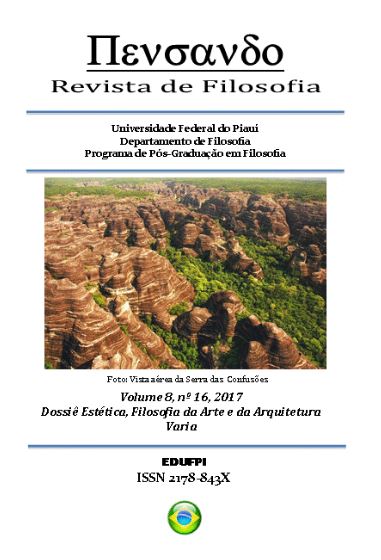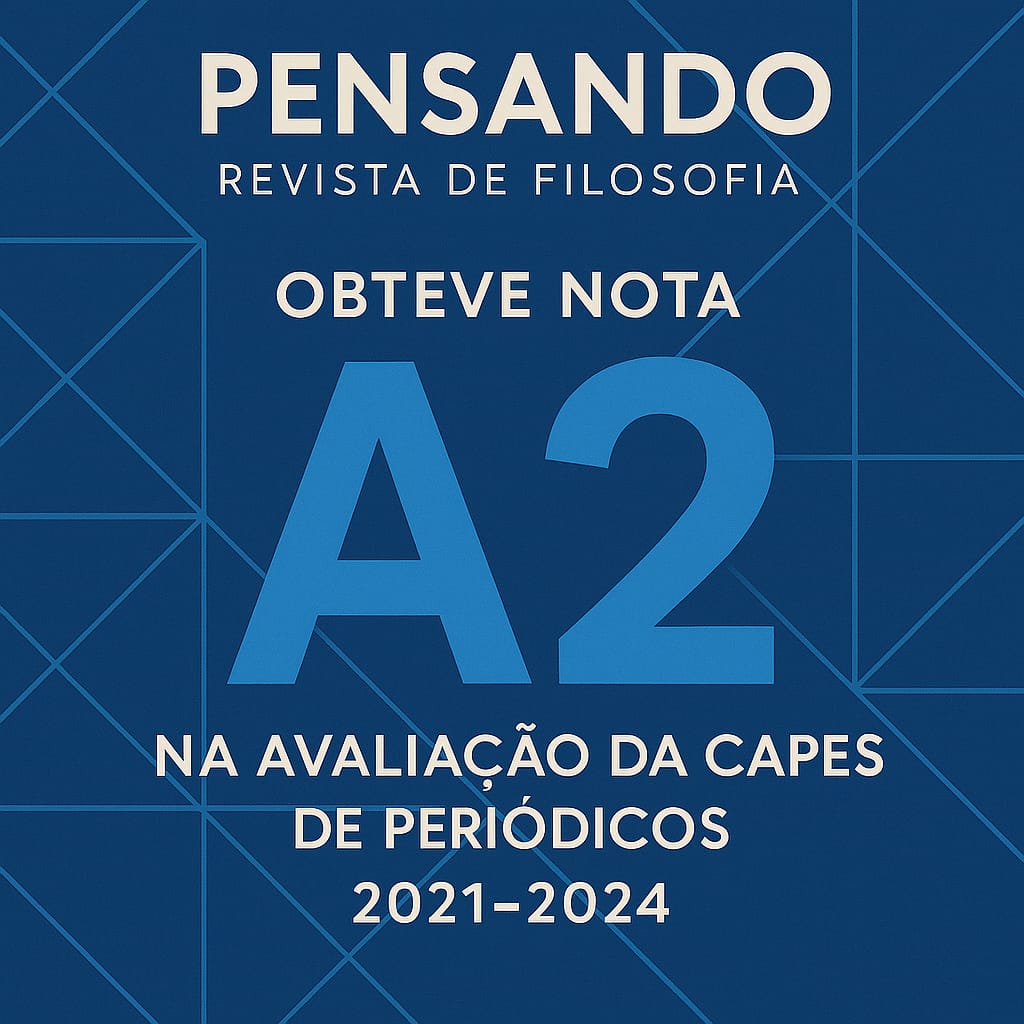PRECAUÇÃO, IDEALIZAÇÃO E FANATISMO
DOI:
https://doi.org/10.26694/pensando.v8i16.6143Palabras clave:
Princípio da Precaução, racionalidade prática, epistemologia, moralidadeResumen
Na literatura recente sobre os desafios gerados pelas novas tecnologias, certos autores defendem o Princípio da Precaução (PP) como um princípio de racionalidade central em deliberações sobre práticas associadas àquelas tecnologias. Há dois sentidos possíveis para ‘precaução’: um formal (constitutivo de racionalidade prática), outro substantivo. Tais autores parecem interpretar o PP no último sentido, a fim de eliminar absolutamente os riscos possíveis das novas tecnologias à humanidade. Contra esta interpretação, (i) argumentaremos que precaução (no sentido substantivo) não é o tipo de consideração que figure adequadamente em uma teoria da deliberação (racional) para ações humanas e (ii) sugeriremos que o PP parece, na verdade, para tais autores, envolver um compromisso moral. Mas, neste caso, ele não é menos controverso do que outros princípios morais.
Citas
Ahteensuu, Marko (2004) ‘The Precautionary Principle in the Risk Management of Modern Biotechnology’, Science Studies, 17, 1: 57–65.
Aven, Terje (2010) Misconceptions of Risk, Sussex: Wiley.
Bedau, Mark A. & Parke, Emily C. (2009) ‘The Precautionary Principle and Its Critics’, in The Ethics of Protocells, Cambridge, Mass.: MIT Press.
Bodansky, Daniel (2004) ‘Deconstructing the Precautionary Principle’, in Caron, David D. & Scheiber, Harry N., Bringing New Law to Ocean Waters, Leiden: Brill.
Clarke, Steve (2005) ‘Future Technologies, Dystopic Futures and the Precautionary Principle’, Ethics and Information Technology, 7:121–126.
Clarke, Steve (2009) ‘New Technologies, Common Sense and the Paradoxical Precautionary Principle’ in Sollie, P. & Düwell, M. Evaluating New Technologies, Springer.
Commission (2000) Communication from the Commission on the Precautionary Principle, The Commission of the European Communities, Brussels.
Engelhardt Jr., H. Tristram, & Jotterand, Fabrice (2004) ‘The Precautionary Principle: A Dialectical Reconsideration’, Journal of Medicine and Philosophy, 29, 3: 301–312.
Gibbard, A. (1992) Wise Choices, Apt Feelings: A Theory of Normative Judgment, Cambridge, Mass.: Harvard University Press.
Giddens, Anthony (2009) The Politics of Climate Change, Cambridge: Polity Press.
Gigerenzer, Gerd (2008) Rationality for Mortals: How People Cope with Uncertainty, Oxford: Oxford University Press.
Goklany, Indur M. (2001) The Precautionary Principle: A Critical Appraisal of Environment Risk Assessment, Washington D.C.: Cato Institute.
Hansson, Sven Ove (1997) ‘The Limits of Precaution’, Foundations of Science, 2: 293-306.
Hare, Richard M. (1981) Moral Thinking: Its Levels, Method, and Point, Oxford: Oxford University Press.
Harman, Gilbert (2000) ‘Moral Agent and Impartial Spectator’, in Explaining Value and other Essays in Moral Philosophy, Oxford: Oxford University Press.
Harremoës, Poul & Gee, David & MacGarvin, Malcolm & Stirling, Andy & Keys, Jane & Wynne, Brian & Vaz, Sofia Guedes (2002) The Precautionary Principle in the 20th Century: Late Lessons from Early Warnings, London: Earthscan.
Harris, John (2007) Enhancing Evolution: The Ethical Case for Making Better People, Princeton, Oxford: Princeton University Press.
Harris, John & Holm, SØren (2002) ‘Extending Human Lifespan and the Precautionary Paradox’, Journal of Medicine and Philosophy, Vol. 27, No. 3, pp. 355-368.
Harris, John & Holm, SØren (1999) ‘Precautionary Principle Stifles Discovery’, Nature 29, 400: 398.
John, Stephen (2010) ‘In Defence of Bad Science and Irrational Policies: An Alternative Account of the Precautionary Principle’, Ethical Theory and Moral Practice, 13: 3-18.
Manson, Neil A. (2002) ‘Formulating the Precautionary Principle’, Environmental Ethics, 24: 263-274.
Marchant, Gary E. (2001) ‘The precautionary principle: an “unprincipled” approach to biotechnology regulation’, Journal of Risk Research 4 (2), 143–157.
Marchant, Gary E. & Mossman, Kenneth L. (2004) Arbitrary and Capricious: The Precautionary Principle in the European Union Courts, Washington D.C.: AEI Press.
Peterson, Martin (2006) ‘The Precautionary Principle Is Incoherent’, Risk Analysis, 26, 3: 595-601.
Peterson, Martin (2007) ‘The Precautionary Principle Should not be Used as a Basis for Decision-making’, EMBO reports 8, 4: 305-308.
Resnik, David B. (2003) ‘Is the Precautionary Principle Unscientific?’, Studies in History and Philosophy of Biological & Biomedical Sciences, 34: 329–344.
Rosati, Connie S. (1995). ‘Persons, Perspectives, and Full Information Accounts of the Good’, Ethics 105: 296–325.
Ross, W. D. (1930/1967) The Right and the Good, Oxford: Clarendon Press.
Sandin, Per (2007) ‘Common-sense Precaution and Varieties of the Precautionary Principle’, in Lewens, T. Risk: Philosophical Perspectives, London: Routledge.
Sandin, Per (2006) ‘A Paradox Out of Context: Harris and Holm on the Precautionary Principle’, Cambridge Quarterly of Healthcare Ethics, 15: 175–183.
Scott, Dayna Nadine (2005) ‘Shifting the Burden of Proof: The Precautionary Principle and Its Potential for the “Democratization” of Risk’, in the Law Commission of Canada (ed.) Law and Risk, Vancouver: UBC Press.
Sunstein, Cass R. (2005) Laws of Fear: Beyond the Precautionary Principle, Cambridge: Cambridge University Press.
von Schomberg, René (2006) ‘The Precautionary Principle and its Normative Challenges’, in Fisher, E., Jones, J. & von Schomberg, R., Implementing the Precautionary Principle: Perspectives and Prospects, Cheltenham: Edward Elgar Publishing Limited.
Watson, G. (1975) “Free Agency”, The Journal of Philosophy, 72, 8, pp. 205-220.
Williams, Bernard (1981) ‘Persons, Character, and Morality’, in Moral Luck, Cambridge: Cambridge University Press.

























